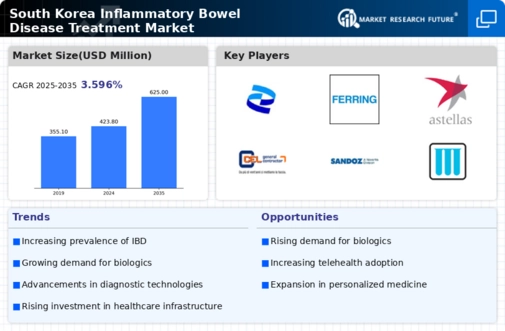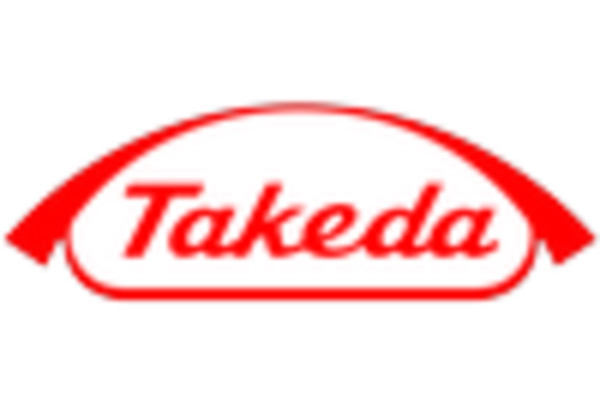Rising Healthcare Expenditure
The increasing healthcare expenditure in South Korea is a significant driver for the inflammatory bowel-disease-treatment market. As the government and private sectors invest more in healthcare services, the availability of advanced treatment options is expanding. In 2025, healthcare spending is projected to reach approximately $200 billion, with a notable portion allocated to chronic disease management, including inflammatory bowel diseases. This trend indicates a growing recognition of the importance of effective treatment for chronic conditions, which is likely to enhance the market for IBD therapies. Additionally, higher healthcare spending may lead to improved infrastructure and access to specialized care, further supporting the growth of the inflammatory bowel-disease-treatment market. The correlation between increased healthcare investment and market expansion suggests a positive outlook for future developments.
Government Initiatives and Funding
Government initiatives aimed at improving healthcare access and funding for inflammatory bowel disease research are pivotal in shaping the treatment market in South Korea. The government has allocated substantial resources to support research and development of new therapies, which is expected to enhance treatment options available to patients. In 2025, public funding for IBD-related research is anticipated to exceed $50 million, reflecting a commitment to addressing the needs of this patient population. Furthermore, policies promoting the inclusion of innovative treatments in national health insurance coverage are likely to increase patient access to necessary therapies. This supportive regulatory environment fosters a conducive atmosphere for pharmaceutical companies to invest in the inflammatory bowel-disease-treatment market, ultimately benefiting patients through improved treatment availability and affordability.
Increasing Awareness and Diagnosis
The rising awareness of inflammatory bowel diseases (IBD) in South Korea is a crucial driver for the inflammatory bowel-disease-treatment market. Enhanced public education campaigns and healthcare provider training have led to earlier diagnosis and treatment. As a result, the number of diagnosed cases has increased, contributing to market growth. In 2025, it is estimated that approximately 0.5 million individuals in South Korea are living with IBD, which represents a significant increase from previous years. This growing patient population necessitates a wider range of treatment options, thereby stimulating demand for innovative therapies and medications. Furthermore, increased awareness among patients about the importance of seeking medical help for gastrointestinal symptoms is likely to drive market expansion, as more individuals are encouraged to pursue treatment options.
Technological Innovations in Treatment
Technological advancements in the treatment of inflammatory bowel diseases are significantly influencing the market landscape in South Korea. The introduction of biologics and biosimilars has transformed treatment protocols, offering more effective and targeted therapies for patients. In 2025, the market for biologics is projected to account for over 40% of the total inflammatory bowel-disease-treatment market, reflecting a shift towards precision medicine. Additionally, the development of digital health solutions, such as telemedicine and mobile health applications, is enhancing patient management and adherence to treatment regimens. These innovations not only improve patient outcomes but also create new opportunities for pharmaceutical companies to introduce novel therapies, thereby driving market growth. The integration of technology into treatment strategies appears to be a key factor in shaping the future of the inflammatory bowel-disease-treatment market.
Patient-Centric Approaches in Treatment
The shift towards patient-centric approaches in the treatment of inflammatory bowel diseases is emerging as a key driver in the market. Healthcare providers in South Korea are increasingly focusing on personalized treatment plans that consider individual patient needs and preferences. This trend is likely to enhance patient satisfaction and adherence to treatment regimens, which is crucial for managing chronic conditions like IBD. In 2025, it is estimated that patient engagement initiatives will lead to a 20% increase in treatment adherence rates among IBD patients. Furthermore, the emphasis on shared decision-making between patients and healthcare providers is expected to foster a more collaborative treatment environment. This patient-centric focus not only improves health outcomes but also drives demand for diverse treatment options, thereby positively impacting the inflammatory bowel-disease-treatment market.
















